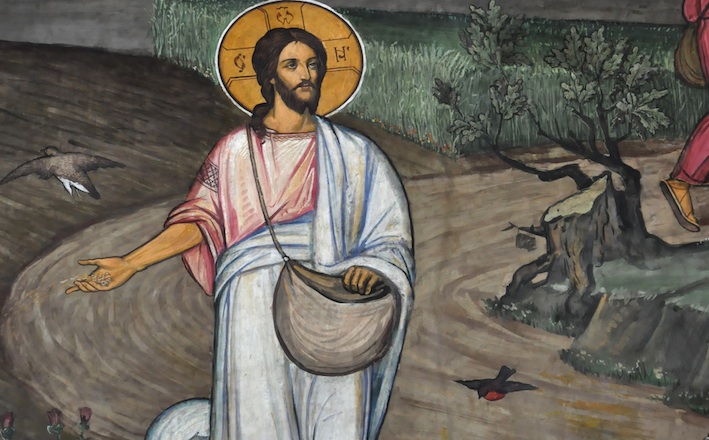Commentary on Matthew 13:1-9, 18-23
The role of Jesus as a teacher is emphasized in the Gospel of Matthew.
Here, in Matthew 13 we find the Gospel’s third major teaching unit. Jesus is teaching the crowds in a series of parables. Good teachers often use metaphors or analogies to make complex or abstract ideas easier to understand. Likewise, in this chapter, through a series of parables Jesus teaches his followers about the kingdom (basilea) of heaven, a complex idea. The first of seven parables is the parable of the seed and the sower.
The setting of this parable is remarkable. Jesus goes to sit by a lake and the crowd follows him. He gets into a boat to sit down. It is not clear what Jesus’ intention for leaving the house and going to the sea might have been — perhaps he was hungry or maybe he simply wanted some peace and quiet. It is also possible that the wide, open space could better accommodate the crowd. The change in scenery is noteworthy because it emphasizes the large crowd. This is an important consideration because the gospel writer later makes a distinction between what Jesus teaches the crowd and what he further explains to his disciples. This parable is clearly told to the large crowd.
By the lake, Jesus tells the crowd about a sower whose seeds fall into various places. Some seeds fall on the path and are eaten by birds (13:4). Other seeds fall on rocky ground, spring up and die quickly because they do not have roots (13:5). Other seeds fall among the thorns and the thorns choke them (13:7). Finally, some seeds fall on good soil and yield fruit (13:8). Jesus ends the parable saying: “The one having ears, let that one hear” (13:9). This translation seems to better capture the prophetic articulations of Elijah and others prophets that precede Jesus who made the similar pronouncements. Jesus, like the prophets, communicates that physically hearing the words is not enough. Discernment or the ability to hear spiritually is necessary to understand this teaching. But what does it mean to hear spiritually?
Hearing spiritually is related to the concept of deep listening. Deep listening is the idea that we listen with compassion. We listen to understand and finally we listen with intention, specifically the intention to act. In other words, to open one’s ears is to open one’s heart. In fact, the Greek word eisakouo can be defined as to hear, to heed, or to obey. Just as a teacher may instruct his/her students to listen closely because the material can be on the test; Jesus ends the parable by telling the crowd to listen not only to understand, but also to act on the teaching, to obey, and in this particular case, to participate in the manifestation of God’s kingdom on the earth.
For the ancient audience, like many of us today, perhaps this parable seems self-explanatory — a sower sows seed and depending on where they fall, there will be various yields. That is, good seed plus good soil results in a harvest. Both parts of the equation are necessary for a yield. However, what is important to notice here is that even in good soil, the increase differs. The gospel writer states: “Other seeds fell on good soil and brought forth grain, some a hundredfold, some sixty, some thirty.” (13:8). The yield of the seeds that fell into the good soil in this example is noteworthy. The increases that Jesus describes are supernatural. Any farmer or sower would be pleased with these outcomes. There must be another factor that influences the harvest in addition to the soil and the seeds.
Growing up near my grandparent’s farm, I understand the importance of both good seed and good soil. However, what can often be overlooked is the sower. My grandmother and dad had what some call “green thumbs.” They knew how to nurture the soil and the seed and could in many cases grow plants where they seemed unlikely to thrive. And so, an equally important part of the equation is the sower.
Unlike the crowd by the sea, we have the benefit of knowing the deeper meaning of this parable. Jesus further explains the parable to his disciples in Matthew 13:18-23. Jesus clarifies that the seeds that fell on the path and were eaten by birds is: “when anyone hears the word of the kingdom and does not understand it, the evil one comes and snatches it away what is sown in the heart; this is what was sown on the path” (13:19). So from this explanation we can deduce that the heart is the soil and the seed is the word of the kingdom. But why does Jesus offer this explanation to his disciples and not to the crowd? I would suggest that it is because the disciples are the sowers. Jesus concludes his explanation to the disciples: “But as for what was sown into good soil, this is the one who hears the word and understands it, who indeed bears fruit and yields, in one case a hundredfold, in another sixty, and in another thirty” (13:23). The sower plants into good soil not knowing what the yield may be.
The disciples, as the sowers, would have the word of God. Through the preaching of the gospel, they share the word of God, the good news of coming of God’s basilea or God’s reign. The sower must share the good news with everyone. When the sower’s seed (the rightly divided gospel) takes root in good soil (pure hearts), the fruit produced is the people of God hearing, understanding, and obeying the word of God. The role of an effective teacher, or preacher for that matter, cannot be underestimated. They, too, can produce a harvest in unlikely places. This is most clearly exemplified by the master teacher, Jesus. Jesus’ teachings continue to provoke us to act righteously thousands of years later.


July 16, 2017